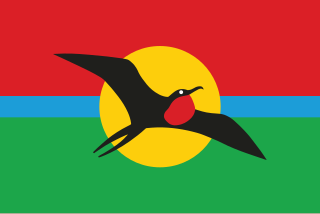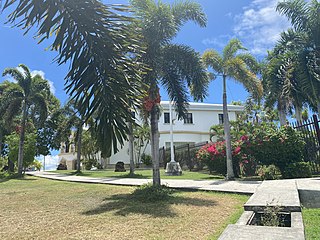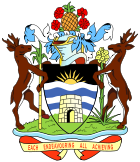
The governor-general of Antigua and Barbuda is the representative of the monarch of Antigua and Barbuda, currently King Charles III. The official residence of the governor-general is Government House.

The prime minister of Antigua and Barbuda is the head of government of the Antigua and Barbuda. The prime minister of Antigua and Barbuda is appointed by the Governor-General under the terms of the Constitution.

The governor-general of Saint Kitts and Nevis is the representative of the monarch of Saint Kitts and Nevis, currently King Charles III. The appointed governor-general, currently Marcella Liburd, lives in Government House, Basseterre, which serves as her official residence.

Belonger status is a legal classification normally associated with British Overseas Territories. It refers to people who have close ties to a specific territory, normally by birth or ancestry. The requirements for belonger status, and the rights that it confers, vary from territory to territory.

Parliament of Sierra Leone is the legislative branch of the government of Sierra Leone. It is principally responsible for making laws. The Sierra Leone parliament consists of 149 members, of which 135 members are directly elected from across Sierra Leone's 16 districts, while 14 are paramount chiefs appointed from the 14 rural districts. The parliament is led by the Speaker of the House; the position is currently held by Abass Bundu of the Sierra Leone People's Party. The current elected 135 ordinary members of parliament are composed of members of the All People's Congress and the Sierra Leone People's Party which are the two largest political parties in Sierra Leone.

The Parliament of Antigua and Barbuda consists of the King of Antigua and Barbuda, the Senate and the House of Representatives.

The House of Representatives of Antigua and Barbuda is the lower chamber of the country's bicameral parliament. Each of the constituencies created in accordance with section 62 of the Constitution shall elect one representative to the House in a direct election in accordance with the procedures specified by or pursuant to any law, subject to the rules of the Constitution. Unless he is prohibited by law from registration as a voter for the purpose of electing a member of the House, every Commonwealth citizen who is eighteen years of age or older and who meets the requirements relating to residence or domicile in Antigua and Barbuda as prescribed by Parliament is entitled to be registered as such a voter in accordance with the provisions of any law in that regard, and no other person may be registered. Every person who is registered to vote in any constituency shall, unless prohibited from doing so by any law, be entitled to vote in accordance with the provisions of any law in that regard in any election of members of the House in that constituency. Voting is free and must be done by secret ballot in accordance with any rules that Parliament may impose during House member elections.

The Senate is the upper house of the Parliament of Antigua and Barbuda. The Senate and the lower chamber, the House of Representatives, together form the bicameral legislature of Antigua and Barbuda. The Senate and the House together may make laws for "the peace, order and good government of Antigua and Barbuda". Any bill other than a money bill may be introduced in the Senate.

The monarchy of Antigua and Barbuda is a system of government in which a hereditary monarch is the sovereign and head of state of Antigua and Barbuda. The current Antiguan and Barbudan monarch and head of state, since 8 September 2022, is King Charles III. As sovereign, he is the personal embodiment of the Crown of Antigua and Barbuda. Although the person of the sovereign is equally shared with 14 other independent countries within the Commonwealth of Nations, each country's monarchy is separate and legally distinct. As a result, the current monarch is officially titled King of Antigua and Barbuda and, in this capacity, he and other members of the Royal Family undertake public and private functions domestically and abroad as representatives of Antigua and Barbuda. However, the King is the only member of the Royal Family with any constitutional role.

The Barbuda Council is a local authority that manages the internal affairs on the island of Barbuda. The council has the authority to buy, acquire, hold, mortgage, and dispose of land and other property. It also possesses a common seal and perpetual succession. The Barbuda Council, which has the authority outlined in the Barbuda Local Government Act, is the government of the island and its coastal zone. The members of the Senate who meet the requirements outlined in paragraph (1) of section 6 of the Barbuda Local Government Act, nine elected members, and the member of the House of Representatives from the Barbuda constituency make up the Council. A Commonwealth citizen who is eighteen years of age or older, was born in Barbuda, is the child of parents who were at least one of their parents' birthplaces, or who has lived in Barbuda for at least three years prior to the date of their nomination for election, and who is a regular resident of Barbuda and a registered voter under the Representation of the People Act are all required to be eligible to be elected as a member of the Council.

Speaker of the House of Representatives of Antigua and Barbuda is the presiding officer in the House of Representatives of Antigua and Barbuda. Prior to conducting any other business, the House must elect a Speaker at its first session following a general election. If the position of Speaker becomes vacant at any point before the next dissolution of Parliament, the House must elect a replacement as soon as is practically possible. The Speaker may be chosen from among House members or from among individuals who are not House members but are eligible to serve in that capacity. Before conducting any other business other than electing the Speaker during the first meeting following a general election, the House shall elect a member to serve as Deputy Speaker. If the position of Deputy Speaker becomes vacant at any point prior to the next dissolution of Parliament, the House shall, as soon as is practically possible, elect another member to fill the vacancy. A minister or parliamentarian cannot be elected as the speaker or deputy speaker of the house by the house. When the position of Speaker is open, the House may not conduct any business.

The Government of Antigua and Barbuda (GOAB), is a unitary constitutional monarchy, where the Monarch of Antigua and Barbuda serves as the head of state, represented by the Governor-General of Antigua and Barbuda, and the Prime Minister of Antigua and Barbuda serves as the head of government.

The Cabinet of Ministers of the Republic of Mauritius is the official council which advises the President of the Republic in the making of major decisions. It is led by the Prime Minister and a total of 23 ministers and the Attorney General, who is considered to be a cabinet member. The constitution of the Republic provides a cabinet under the leadership of the Prime Minister that must be appointed by the President after each general elections.

The Constitution of Barbados is the supreme law under which Barbados is governed. The Constitution provides a legal establishment of the Government of Barbados, as well as legal rights and responsibilities of the public and various other government officers. The Constitution which came into force in 1966 was amended in 1974, 1980, 1981, 1985, 1989, 1990, 1992, 1995, 2000, 2002, 2003, 2005, 2007, 2009, 2010, 2018, 2019, 2020 and 2021. The 1966 document succeeds several other documents concerning administration of Barbados. One of them, the Barbados Charter, is discussed in the present Constitution's Preamble. Prior statutes were created for the administration of Barbados as a colony. As a former English and later British colony, the Constitution is similar to those of other former Commonwealth realms, yet distinctly different in the spirit of the Statute of Westminster.

The Cabinet of Antigua and Barbuda is the executive branch of the government of Antigua and Barbuda. Section 70(1) of the Constitution establishes the Cabinet. The Cabinet is made up of the Prime Minister and as many other Ministers as the Prime Minister deems necessary, one of whom will be the Attorney-General and will be nominated in accordance with section 69 of the Constitution. Only the Prime Minister or, in his absence, the Minister the Prime Minister appoints in that regard, may call the Cabinet to order.

The Constitution of Antigua and Barbuda is the supreme law that governs the country. The Constitution lays out the legal foundation for the Antigua and Barbuda government as well as the rights and obligations of the general public and other public servants. In 1981, the Constitution went into effect. The Antigua Constitution and Elections Order, as well as the Constitution of the Associated State of Antigua, are among the texts pertaining to Antigua and Barbuda's governance that have been superseded by the 1981 document.
The Constitution of Tuvalu states that it is “the supreme law of Tuvalu” and that “all other laws shall be interpreted and applied subject to this Constitution”; it sets out the Principles of the Bill of Rights and the Protection of the Fundamental Rights and Freedoms.

Antigua, officially the Associated State of Antigua, was an associated state of the United Kingdom, which was established on 27 February 1967. The associated state was abolished on November 1, 1981, by the Antigua Order.
The Supreme Audit Institution of Antigua and Barbuda, co-officially known as the Office of the Director of Audit, is the supreme audit institution of Antigua and Barbuda, and as such, assists the Parliament in holding the government accountable in management of the country's finances and operations. The institution describes itself as "an independent, constitutionally established office that exists to serve Parliament."

The judiciary of Antigua and Barbuda is an independent branch of the Antiguan and Barbudan government, subject to the Constitution of Antigua and Barbuda. Even though the Office of the Attorney General in the executive branch appoints magistrates, the judicial branch is mostly independent of the other two branches. The Magistrate's Court handles minor offenses, while the High Court handles major ones, makes up the judiciary. A matter must be sent to the Court of Appeal in the Eastern Caribbean Supreme Court, whose members are chosen by the OECS, in order to move past the High Court. The heads of state in the OECS system must unanimously approve any appointments or removals of Supreme Court magistrates. The attorney general's advice is the basis for the prime minister of Antigua and Barbuda's decision-making on this court.










